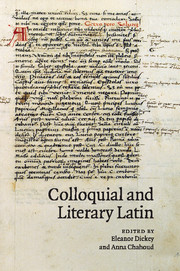Book contents
- Frontmatter
- Contents
- List of contributors
- Acknowledgements
- Foreword (David Langslow)
- PART I THEORETICAL FRAMEWORK
- 1 Introduction
- 2 Colloquial language in linguistic studies
- 3 Roman authors on colloquial language
- 4 Idiom(s) and literariness in classical literary criticism
- 5 Preliminary conclusions
- PART II EARLY LATIN
- PART III CLASSICAL LATIN
- PART IV EARLY PRINCIPATE
- PART V LATE LATIN
- Abbreviations
- References
- Subject index
- Index verborum
- Index locorum
5 - Preliminary conclusions
Published online by Cambridge University Press: 04 April 2011
- Frontmatter
- Contents
- List of contributors
- Acknowledgements
- Foreword (David Langslow)
- PART I THEORETICAL FRAMEWORK
- 1 Introduction
- 2 Colloquial language in linguistic studies
- 3 Roman authors on colloquial language
- 4 Idiom(s) and literariness in classical literary criticism
- 5 Preliminary conclusions
- PART II EARLY LATIN
- PART III CLASSICAL LATIN
- PART IV EARLY PRINCIPATE
- PART V LATE LATIN
- Abbreviations
- References
- Subject index
- Index verborum
- Index locorum
Summary
What do these investigations tell us about what colloquial Latin is and how to find it? Clackson tells us that there is no point looking to linguistics for an immediate solution to our problem: linguists avoid the term ‘colloquial’ because of its ambiguities and associated value judgements. Ferri and Probert tell us that the Roman rhetoricians and grammarians do not provide a full answer either: the way the Romans divided up language into registers is not fully understood and was fluid not only diachronically but also synchronically. Chahoud makes it clear that modern research on colloquial Latin is not much more help. For the past century most work on colloquial Latin has relied on stylistic criteria that are supposed to be characteristic of actual conversational usage but have never been clearly demonstrated to have a close connection with it, and there is widespread disagreement among commentators over whether individual passages are colloquial or not. Such disagreement cannot be resolved by any appeal to a generally accepted set of principles about colloquial Latin, for there are no such principles, nor any agreement about what it is.
On the basis of these investigations we can, however, state the range of things that colloquial language and colloquial Latin in particular has been said to be and therefore could be. Colloquial Latin could be the words and usages that Latin speakers (or just those Latin speakers who lived before or during the Augustan age) employed freely in conversation but avoided in their formal literary productions.
- Type
- Chapter
- Information
- Colloquial and Literary Latin , pp. 65 - 68Publisher: Cambridge University PressPrint publication year: 2010

